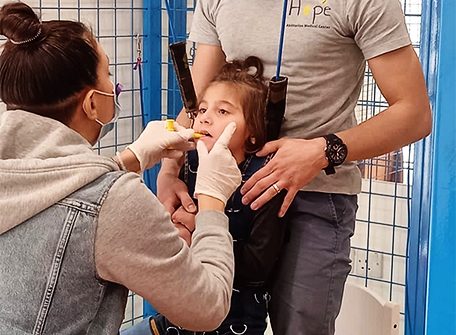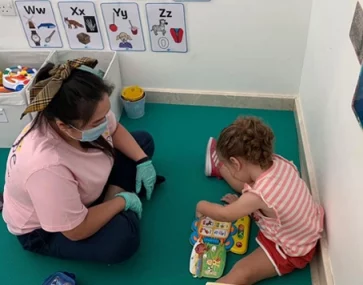Especially in working with individuals with ASD
Studies focusing on the effectiveness of speech and language therapy interventions emphasize the importance of parental involvement in the childcare process (Krieger et al., 2013; Ilg et al., 2016). In fact, recommendations evolving around the parent-professional partnership have been made both internationally and nationally (Abouzeid et al., 2014; Devescovi et al., 2016):
- In the United States, laws relating to the education of a person with a disability or disorder call not only for early intervention with children but also for the collaboration of families in the intervention (California Departments of Education, 1997).
- In Quebec, the law on health services and social services requires the development of an individualized service plan (ISP) that considers the roles and responsibilities of the family circle (Poirier et al., 2015).
- In France, professionals are prompted to adopt an approach that prioritizes parental participation (Rogé, 2008).
Finally, the recommendations for good professional practice as elaborated by the National Agency for the Evaluation and Quality of Social and Medical Establishments and Services underline the importance of placing families at the center of the educational and therapeutic interventions offered to their children. They postulate that “involving parents ensures the coherence of the modalities of interaction with the child and allow the carryover of their skills by giving them the possibility to take part in the educational and therapeutic sessions or to benefit from support, training or a therapeutic education program” (quoted by CNSA, 2016).
Briefly, the support of parents targets not only a better development of the child but also the well-being of his/her family. Ould Taleb (2011) notes that the training and participation of parents in their child’s therapies does not replace the therapeutic work of professionals but complements it. Close parent-professional collaboration is therefore essential to follow and apply an individualized intervention plan for the child and his/her family.
Parental Coaching and Autism Spectrum Disorders (ASD)
Many studies focusing on the quality of life of families with children with ASD highlight a complex and varied reality (Poirier and Rivières Pigeon, 2013). The resulting uncertainty from establishing a diagnosis and confirming it, and from the problems related to the characteristics of ASD lead to a significant impact on all the dimensions of the daily life, be it individual, family and even marital (Goussot et al., 2012). Parents may subsequently present with a higher level of stress and anxiety affecting their well-being and that of the child (Dunn et al., 2002). Moreover, various studies show that the severity of the symptoms of autism present in the child is often at the origin of the challenges faced by parents: the more pervasive the difficulties are, the higher the level of stress in parents (Hastings et al., 2005; Cotton and Rihdale, 2006; Altière et al., 2009).
Rogers (2000) specifies that it seems that the problematic symptoms that are most difficult for parents to live with are those affecting communication and social interaction as well as the behavioral problems that can result from them. As a result, parents of children with autism report greater difficulty in describing their ability to understand and respond appropriately to their child’s needs compared to parents of typically developing children or those with other developmental disabilities (Dunn et al. al., 2001).
Faced with profound changes altering the family sphere, parents can feel a heavy educational burden. In addition, the resulting negative feelings often affect the behavior of the child (Ilg et al., 2016). It is therefore necessary, even essential, to help the parents of children with ASD, who are still too often neglected by professionals (Altière et al., 2009). Parental involvement not only improves parental competence and reduces perceived stress, but also improves parent-child interactions (Ilg et al., 2016). Subsequently, better parental intervention has the effect of reinforcing the effect of interventions intended for the child (Goussot et al., 2012).




